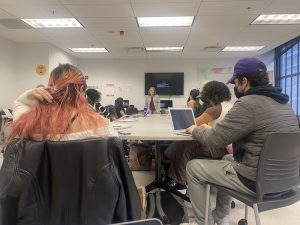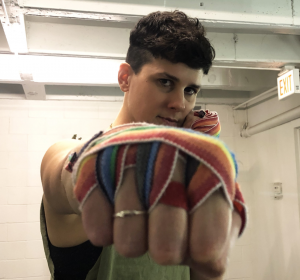
Patti Pacino, a councilwoman on the Batavia, New York City Council, reads official documents five times over before heading to regular meetings to avoid questioning from her male counterparts.
“I read everything over and over,” Pacino said. “I don’t ever have the luxury of saying ‘Oh, tell me about it, I don’t remember.’ I would never be able to say that.”
At the beginning of her first term, Pacino also found that men on the council often ignored her.
“When I started, I got a lot of that feeling of, ‘Don’t you worry your pretty little head, sweetie,’” Pacino said. “They didn’t particularly have more experience than I did. It was just that they felt more comfortable with a guy next to them.”
For Pacino, this has improved.
“I happen to be very outspoken, very loud,” Pacino said. “I have no problem saying, ‘Hey, excuse me, I was in the middle of a sentence.’”
Nationwide, however, Pacino is an exception. Though most decisions made by lawmakers are at the local level, women remain in the minority in municipal government.
Though the recent presidential election brought many issues of sexism in politics to light, it is not exclusively a federal issue. Discrimination is common in local office. According to a report by the International City/County Management Association, only 30 percent of municipal government department leaders are women. Just 13 percent of those women have chief administrative positions- the same percentage as in 1984.
Across the country, local female legislators do not have the same representation in higher offices as men. Only one in four state legislators and only one in five members of Congress are women, according to the National Conference of State Legislatures. Only 37 women have ever served as governor.
“For a variety of complicated social and cultural reasons… women tend to feel somewhat more protective of their families and somewhat more concerned about having a public presence,” said Ann Logue, the president of the Chicago chapter of the League of Women voters.
A 2012 report by American University professor of government Jennifer Lawless and Loyola Marymount University political science professor Richard Fox found that women often perceive the electoral environment as more unfair than men, and tend to be less confident in themselves whilst running for office. The report also discovered that women are less likely to have it suggested to them to run for office, and that they are still responsible for the majority of tasks in the home.
“The idea that politics happens in all these kinds of interactions we have owes a lot to second wave feminism,” said Robert Watkins, associate professor of Political Science and Cultural Studies at Columbia College Chicago. “I think we’ve seen since this last election that there’s a lot of sexism around in the country still and it shows that there’s so much work left to be done.”
Forms of discrimination such as rape culture often make women feel like they are fighting a political battle in their daily lives, Watkins said.
Oak Park, Illinois Village trustee, Colette Lueck, is often excluded from conversation on the board, much like Pacino. Without saying, “Please call on me, I have something to say,” she finds that she is an afterthought.
“At the board table, the president will often say, ‘Oh, yeah, and Collette, I forgot to ask, what do you think about this?’” Lueck said. “That happens regularly. “
There are two women and four men on the Oak Park Village Board. The Batavia City Council has a similar ratio: three women to six men. This is an unusually equal ratio.
“In a lot of places, there is only one woman,” Pacino said. “It doesn’t seem to have been a problem here to be a woman [and be] elected… Here, it does seem to actually be chosen by the voters in your area.”

But being listened to isn’t the only problem women have in local office. Lueck finds that even when she is able to speak her mind at the table, many important decisions have already been made.
“Only men are on the committees that deal with the finances,” Lueck said. “The [financial] decisions come before the board, but because the committees have already reached their consensus, they have the votes to pass whatever they want to pass and they’ve already agreed to whatever that is. There are no women in that process at all.”
On the Batavia City Council, Pacino is satisfied not serving on a finance auditing committee.
“[Finance] is not my strong point… There are other people who are really good at that,” Pacino said. “It’s wonderful to have a diverse group because you can say, ‘Wait, I happen to know more about that than you.’”
For Lueck, discrimination goes beyond governing and works its way into simple conversation. She often finds herself sitting quietly before the village board in the midst of conversations about sports and golfing.
Though Lueck knows some women are well versed on these subjects, she finds that the conversation excludes the women on the board, who feel they have nothing to contribute.
“It’s the kind of guy talk, locker room talk that is clearly not designed to exclude women, but in fact does,” Lueck said. “They don’t choose to talk about things that would be of common interest because it’s men driving the conversation… [I’m] clearly the minority at the table.”

















Be First to Comment